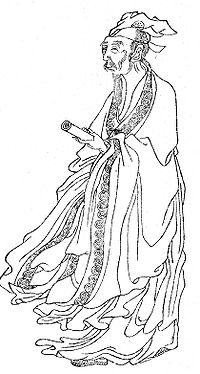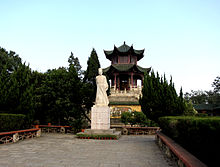- Bai Juyi
-

Names Chinese: 白居易 Pinyin: Bó Jūyì or Bái Jūyì Wade-Giles: Po Chü-i or Pai Chü-i Zì 字: Lètiān 樂天 Hào 號: Xiāngshān Jūshì 香山居士
Zuìyín Xiānshēng 醉吟先生Shì 謚: Wén 文 (hence referred
to as Bái Wéngōng 白文公)Bai Juyi (Chinese: 白居易; pinyin: Bái Jūyì; Wade-Giles: Po Chü-i; Japanese: はく きょい ('Haku Kyo'i)) (772–846) was a Chinese poet of the Tang dynasty. Many of his poems concern his career or observations made as a government official, including as governor of three different povinces. Bai Juyi was also renowned in Japan, and today his fame is worldwide.
Contents
Life
Bai Juyi was born and lived in the period poetically considered to be Middle Tang. This was a period of rebuilding and recovery for the Tang Empire, following the An Shi Rebellion, and poetically following the poetically flourishing era famous for Li Bo (701-762), Wang Wei (701-761), and Du Fu (712-770). Bai Juyi lived through the reign of eight or nine emperors, being born in the Dali regnal era (766-779) of Emperor Daizong of Tang.
Birth and childhood
Bai Juyi was born in 772[1], in Taiyuan, Shanxi,[2] which was then a few miles from the modern city. Although he was in Zhengyang, Henan for most of his childhood.[3] His family was poor but scholarly, his father being an Assistant Department Magistrate of the second-class.[4] At the age of ten he was sent away from his family to avoid a war that broke out in the north of China, and went to live with relatives in the area known as Jiangnan, more specifically Xuzhou.
Early career
Bai Juyi's official career was initially successful. He passed the jinshi examinations in 800.[5]. And, Bai Juyi seems to have taken up residence in the western capital city of Chang'an, in 801.[6] And, not long after this Bai Juyi and Yuan Zhen began their long friendship.[7] Bai Juyi's father died in 804, and the young Bai spent the traditional period of retirement mourning the death of his parent, which he did along the Wei River, near to the capital.[8] In 806, Bai Juyi was appointed to a minor post as a government official, at Zhouzhi,[9] which was not far from the Chang'an (and also in Shaanxi province). He was a made a member (scholar} of the Hanlin Academy, in 807[10], and Reminder of the Left from 807 until 815.[citation needed] Except that in 811, his mother died: he spent the traditional three year retirement period, again along the Wei River; and then, returned to court in the winter of 814.[11], where he held the title of Assistant Secretary to the Prince's Tutor[12], not exactly the highest ranking position, but one which he was soon to loose.
Exile
While serving as a minor palace official, 814, Bei Juyi managed to get himself in official trouble. He managed to make a few enemies at court or in other official positions. In 815 when he was demoted and exiled after remonstrating with the Emperor Xianzong over the failure to catch the murderer of two high officials.
Later career and death
His career resumed when he was made Prefect of Hangzhou (822-824) and then Suzhou (825-827). His grave is situated on Xiangshan, across the Yi River from the Longmen cave temples in the vicinity of Luoyang, Henan.
Works
Bai Juyi wrote over 2,800 poems, which he had copied and distributed to ensure their survival. They are notable for their relative accessibility: it is said that he would rewrite any part of a poem if one of his servants was unable to understand it. The accessibility of Bai Juyi's poems made them extremely popular in his lifetime, in both China and Japan, and they continue to be read in both countries today.
Two of his most famous works are the long narrative poems The Song of Everlasting Sorrow, which tells the story of Yang Guifei, and The Song of the Pipa Player. Like Du Fu, he had a strong sense of social responsibility and is well-known for his satirical poems, such as The Elderly Charcoal Seller.
Bai Juyi also wrote intensely romantic poems to fellow officials with whom he studied and traveled. These speak of sharing wine, sleeping together, and viewing the moon and mountains. One friend, Yu Shunzhi, sent Bai a bolt of cloth as a gift from a far-off posting, and Bai Juyi debated on how best to use the precious material:
- About to cut it to make a mattress,
- pitying the breaking of the leaves;
- about to cut it to make a bag,
- pitying the dividing of the flowers.
- It is better to sew it,
- making a coverlet of joined delight;
- I think of you as if I'm with you,
- day or night.[13]
References
- Arthur Waley, The Life and Times of Po Chü-I, 772-846 A.D (New York,: Macmillan, 1949). 238p.
- Waley, Arthur (1941). Translations from the Chinese. New York: Alfred A. Knopf. ISBN 978-0394404646
See also
- List of emperors of the Tang Dynasty
Notes
- ^ Waley (1941), 126
- ^ Waley (1941), 127
- ^ Waley (1941), 127
- ^ Waley (1941), 127
- ^ Waley (1941), 126
- ^ Waley {1941}, 127
- ^ Waley {1941}, 127
- ^ Waley {1941}, 126 and 130
- ^ Waley {1941}, 126
- ^ Waley {1941}, 126
- ^ Waley {1941}, 126
- ^ Waley {1941}, 130
- ^ Hinsch, Bret. (1990). Passions of the Cut Sleeve. University of California Press. pp. 80-81
External links
- Bai Juyi: Poems English translations of Bai Juyi's poetry.
- Translations of Chinese poems
- Chinese poems in translation
- Six Bai Juyi's poems included in 300 Selected Tang Poems, translated by Witter Bynner
- Nienhauser, William H (ed.). The Indiana Companion to Traditional Chinese Literature. Indiana University Press 1986. ISBN 0-253-32983-3
- Article on the Shanghai Oriental Pearl Tower that was based on a poem by Bai Juyi
- Bai Juyi, in wikilivres.info (CC licence)
Categories:- 772 births
- 846 deaths
- Tang Dynasty politicians
- Tang Dynasty poets
- Three Hundred Tang Poems poets
- Tang Dynasty musicians
- Guqin players
- 9th-century writers
Wikimedia Foundation. 2010.


